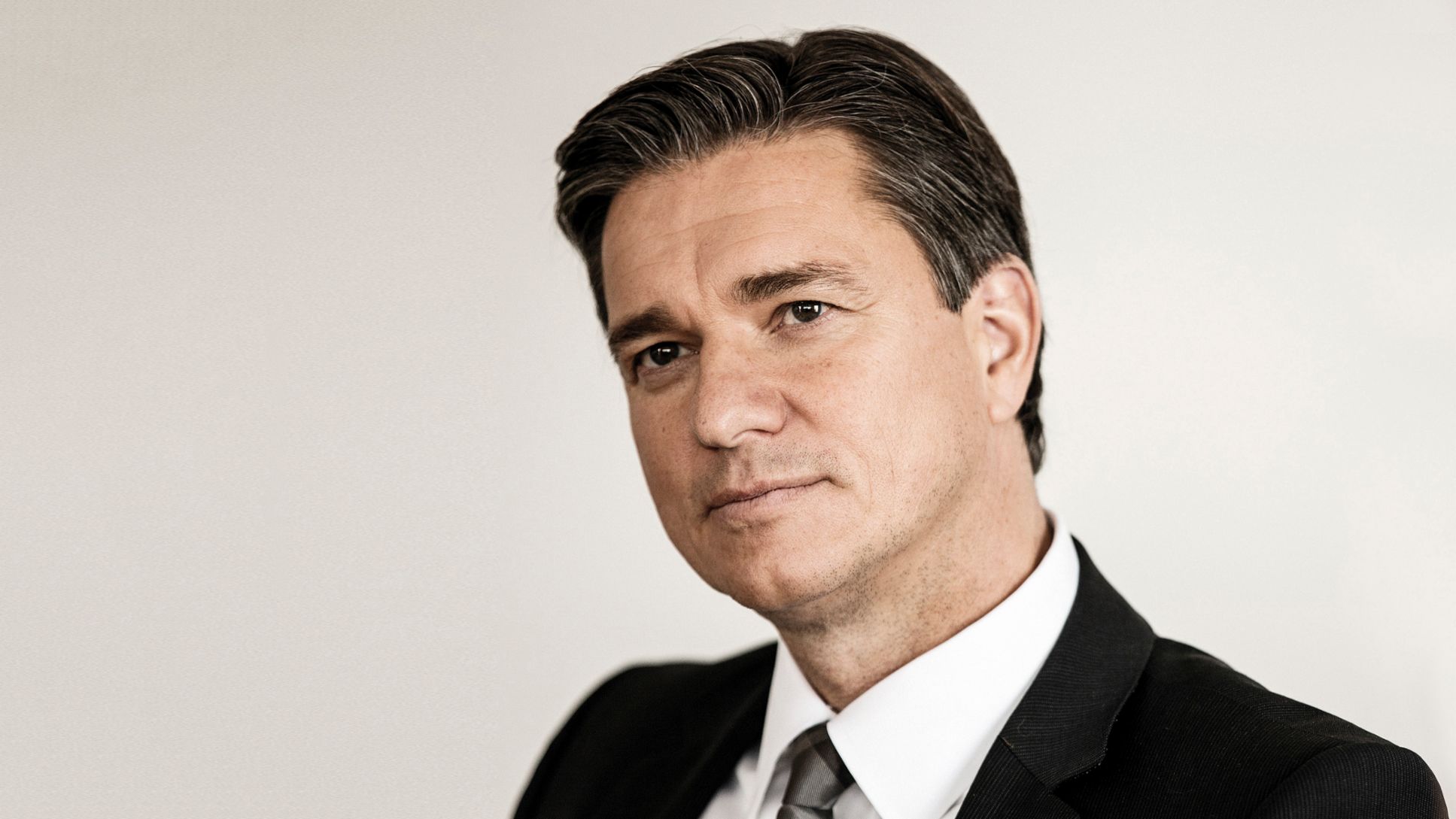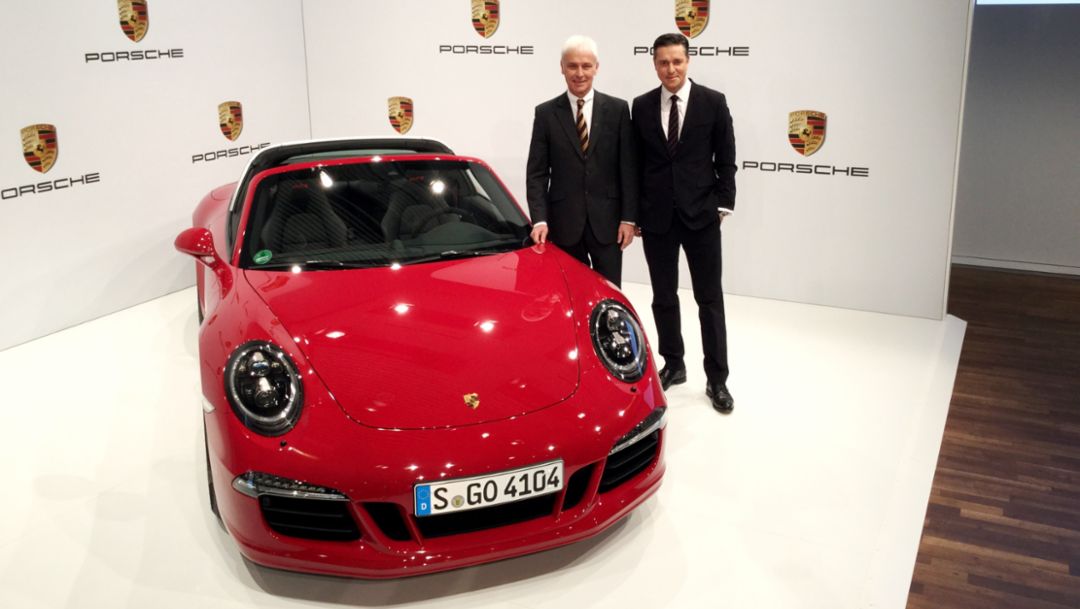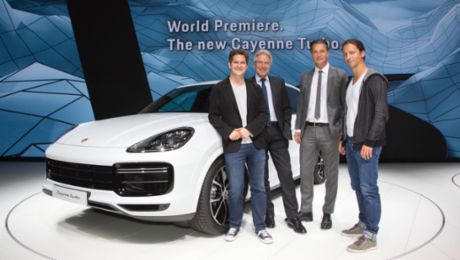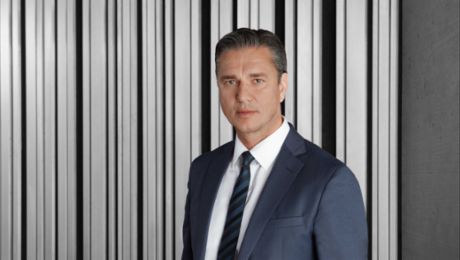Porsche is seen as the most profitable car manufacturer in the world and is the pearl of the Volkswagen Group, with an operating margin of 16 per cent. Is it even possible to improve on this?
With an operating margin of 16 per cent, we are the global leader in our industry. But if we take a look at our massive investment in additional production capacity, creating new jobs and the development of CO2–reducing drive systems, then it soon becomes clear that it would be wrong to refer to it as an increase. My objective is to remain the economically most successful car manufacturer in the long term. In order to achieve this, we need to further increase our efficiency. That is why this issue is regularly at the top of my agenda.
Another factor is that you, as a manufacturer of exclusive sports cars, do not have such a comprehensive portfolio as other OEMs, whose compact cars could help achieve the required reduction in C02 emissions. Do you have the feeling that your clientele lay store by C02 reduction?
Our customers go with the spirit of the age. Of course there are still customers who are only interested in pure performance and the vehicle dynamics of our cars, but we keep a very close eye on the changing demands. You already know our response to this development: plug-in hybrids. With the Cayenne S E-Hybrid, the Panamera S E-Hybrid and the 918 Spyder, we are the only to brand worldwide that already offers three plug-in hybrid models in the premium segment.
A key element of the Porsche corporate strategy is the enthusiasm of our customers thanks to a unique buying and ownership experience. Are you taking further steps to influence the brand and buying experience?
Porsche is an engineering company, as can be seen from the "Dr. Ing." in the name of our company "Dr. Ing. h.c. F. Porsche AG". This stakes our claim: to manufacture the most sporty and technologically advanced cars in the competitive environment. From the Macan sport-utility vehicle, with a starting price of just over €50,000, to the 911 Turbo S for approximately €200,000, you will find this aspiration realised in all of our models. And with our super sports car, the 918 Spyder, I am sure that you won’t find a better car in the whole wide world that contains more technology than this highly innovative milestone development with its high-performance plug-in hybrid drive.
Another very important aspect is the quality. Every customer puts their car to the test every day they drive it. You can see how seriously we take this from the annual surveys conducted by market research firm J.D. Power. Porsche regularly takes top spot in the brand ranking of car manufacturers. But in my eyes, the ownership experience extends much further than that. An absolutely typical Porsche characteristic is the scope of the customer experience offered by our models. Taking your 911 out for a spin on the race track on a Saturday morning, and then take it for the drive to the opera in the evening – that’s what I call an amazing ownership experience. This high level of everyday practicality offered by our sports cars is one of the most important characteristics of the Porsche brand.
So far, Porsche has positioned itself as a classical sports car manufacturer, although there has clearly been some diversification over the years and the portfolio was recently further expanded with the addition of the Macan. If you take a look around at other brands and products made by the Group, you will see that more and more electronic features are built into the cars and that these are increasingly significant for making purchasing decisions. Is the "Connected Car" gaining importance for your clientele?
Absolutely! But there are differences in the customers’ expectations of different brands. The emphasis differs here and there. Our customers not necessarily place the focus on pure autonomous driving, for example. When it comes to the intelligent car of the future, we address four fields of innovation:
1. "Safety and security" – this is all about applications such as car theft protection and calling for assistance in the event of a breakdown.
2. "Remote functions" – by this we mean personalised services such as remote programming for the auxiliary heater or charge management monitoring for our plug-in vehicles.
3. "Swarm intelligence" – this term stands for exchanging data within a large group with the aim of being able to offer real time traffic information, for example.
4. "Infotainment and navigation" – this field of innovation focuses on applications that provide information and entertainment in the vehicle.
Is that really important to the typical Porsche customer? Do your customers actually want to have the trendiest infotainment system as well as the motor sound, chassis and design?
At first sight one might be inclined to think, no we don’t necessarily need the trendiest infotainment system, but we always have to think globally and take differences in mentality into account. The topic of "infotainment" plays a different role for Chinese customers than for Germans, for instance.
If we were to look back 10 or 15 years into the past, we could have expected Porsche to have the best mechatronic and chassis engineers in the world. If the Porsche car of the future would also have a higher level of connectivity etc., that means that future Porsche employees will, at least in part, need different qualification profiles. Am I right?
Definitely. First of all, we should bear in mind that Porsche has increased its workforce from about 13,000 to a good 22,000 since 2010 – an increase of over 60 per cent. In the future we will need even more staff in the field of information technology. When it comes to female applicants, I would like to point out that we strive to tap on the potential that is available on the employment market. For example, we offer young mothers conditions that allow them to pursue a successful career path because at Porsche we are taking new paths to be able to offer all of our employees an attractive working environment in the long term. This includes providing possibilities for greater individualisation of working hours to suit people’s individual life situations, support for young families by offering childcare and the possibility to take family care leave.
Staying on the topic of new occupational profiles: today’s young professionals with a technical background are all more or less at home in the digital world. How is it possible to let these young people know that they don’t need to join Google or HP to be able to make use of their software skills? Porsche offers them the best brand name and the best product, and they have a wide range of opportunities to play a decisive role in shaping the future of the motorcar. How can that be conveyed in future?
You have already mentioned the key arguments. That is what it is all about: We need to combine these two inspiring worlds into one. Don’t forget that computer fans are often car enthusiasts, too. The "Connected" topic basically brings all of the functions of our company together. We need young people from the digital world, who don’t just come to work for us as an "IT or programming giant", but who want to take overall product responsibility. In principle, the automotive industry used to look for people with petrol in their blood, but now we also need people who bring a different set of interests and values with them and aren’t primarily interested in cars. They are the ones we need to inspire and grab their attention. That would also mean that we would need to slightly change our recruiting, both in terms of the messages we send as well as the channels we use. Of course we are on Facebook and also relatively well established on other social media. What matters to me is that we can offer a working environment in tune with the spirit of the age. Every Porsche is a sports car, so in keeping with this, we also sponsor major sporting events, ranging from tennis to basketball. If I take that a step further and say "We need to raise interest for us as an employer elsewhere, too", then we could find opportunities in the field of sponsoring that have nothing to do with the existing, established platforms. That is certainly conceivable. We are currently helping society with our commitment in the fields of "social activities", "education and science", "culture" and "sport", for which we are developing local and international projects and initiatives. Our largest single commitment is our support for the John Cranko school in Stuttgart. Through this clear commitment to the training of ballet students we also want to signal our dedication to a lasting partnership with the Stuttgart Ballet. I think that we can make a good contribution, especially by supporting activities for young people, and thus also be perceived in this way. Porsche places great importance on its social image.
Finally, I would be interested to know what Porsche will be like in 2020. If we take a look at the new 911 model generation, which characteristics will distinguish the 911 of the future?
Fundamentally it will retain the same characteristics as before. There can be no compromises when it comes to the driving characteristics of the 911, but of course we keep up with the times: with our plug-in drives we have already taken a leading role in the premium segment.
So, will the Porsche of the future – in addition to all of the attributes mentioned above – also be connected?
Certainly!
The interview was conducted by Wolfgang K. Eckelt. Text first published in Top Career Guide Automotive 2015.
Consumption data
918 Spyder: Combined fuel consumption: 3,1 – 3,0 l/100 km; CO₂ emissions: 72-70 g/km; Electricity consumption 12.7 kWh/100 km
918 Spyder (Weissach package): Combined fuel consumption: 3,0 l/100 km; CO₂ emissions: 70 g/km; Electricity consumption: 12.7 kWh/100 km
Cayenne S E-Hybrid: Combined fuel consumption: 3,4 l/100 km; CO₂ emissions: 79 g/km; Electricity consumption: 20.8 kWh/100 km
Panamera S E-Hybrid: Combined fuel consumption: 3,1 l/100 km; CO₂ emissions: 71 g/km; Electricity consumption: 16,2 kWh/100 km
Macan: Combined fuel consumption: 9,2–6,1 l/100 km; CO₂ emissions: 216–159 g/km
911 Turbo S: Combined fuel consumption: 9,7 l/100 km; CO₂ emissions: 227 g/km
911: Combined fuel consumption: 9,0 – 8,2 l/100 km; CO₂ emissions: 211 – 191 g/km


/b-S19_1087_fine.jpg/jcr:content/b-S19_1087_fine.jpg)


